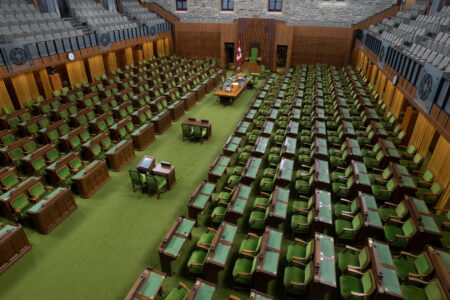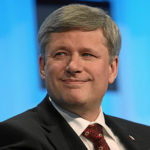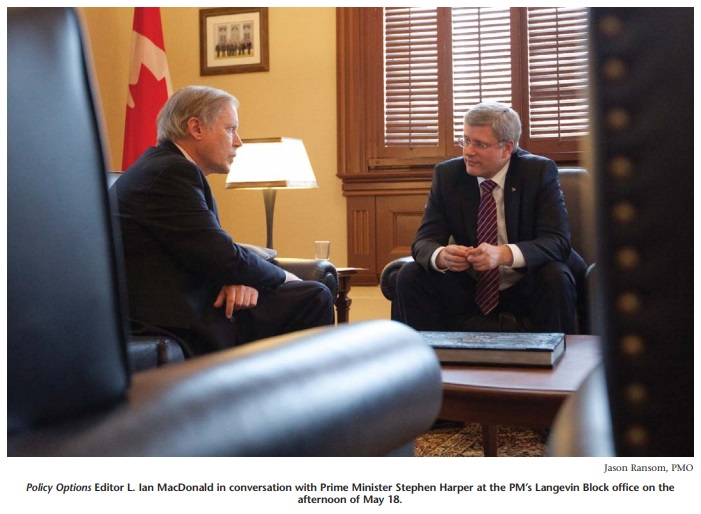
POLICY OPTIONS: Prime Minister, thank you for doing this. Congratulations.
PRIME MINISTER STEPHEN HARPER: Thank you.
PO: You’ve just come from the cabinet shuffle this morning where you had a very delicate balance of 73 Ontario MPs to figure out what to do with, and five Quebec MPs, of whom four are in the cabinet. It seems to me that Quebec had a pretty good day today, in the circumstances. Is it true that in cabinet making you can only work with what you’ve got?
STEPHEN HARPER: Well, the reality of course is that, you know, in our system of government, we appoint those who are elected, and being elected is important, and of course especially, as I say, when people are elected against the tide, that’s, I think, an indication of real political ability, which should not be ignored. As you know, there’s a balance, in terms of regional representation, between the relative size of a province and then the relative size of it within your caucus, and so in the end I’ve appointed the number of Quebecers I think is warranted, given those two factors. And they’re strong members, and I think they’ll do a good job for the province. Obviously we wish we had more, but the guys we have, I think, will all do very good jobs.
PO: With real roles, too, right? Real responsibilities.
STEPHEN HARPER: Absolutely.
PO: Looking ahead to the next Quebec election in 2012 or 2013, how do you see your relationship with Mr. Charest, and what are the prospects of an harmonized sales tax deal in the budget and the Throne Speech?
STEPHEN HARPER: Well, first of all, I think I should emphasize that, as I said on election night, the government will govern for all Canadians, regardless of whether they voted for us or not, and Quebec remains an important part of the country. And look, an important place where we also think down the road we have greater electoral prospects. In terms of the Quebec government, I think for the most part we’ve had pretty good relations with the Quebec government. You know, if you look at our government and the provincial government compared to just about any combination of federal/provincial government, we’ve had one of the best relationships in history. The Quebec government worked hand in glove with us on the Economic Action Plan, which is a big success in the province, as elsewhere. We concluded Old Harry [an oil and gas deal] just before the election, and we will be provisioning for an HST agreement with Quebec in the revised budget we’ll present in June. But obviously we still have some work to do to actually conclude the agreement, but I’m very optimistic we’re going to get there. We’ve made significant progress in the months leading up to the election, so they can now be completed.
PO: Looking back on the campaign, do we now have a new Conservative majority in this country that you’ve constructed, primarily with Ontario and the West? Not to exclude Quebec, but…
STEPHEN HARPER: Yes.
PO: And what were your feelings on election night? Did you feel that a 10year project had finally been achieved, that in 10 minutes, the time it took to see a majority emerging on television, a 10-year project had been achieved?
STEPHEN HARPER: It was 10 years. As you know, I’ve never made a secret that my goal is to make the Conservative Party the natural governing party of the country. I don’t think three consecutive victories and one majority assures that. I think there is much more work to be done. Obviously I’m delighted with the results, delighted that we got the majority, delighted with — as you say, if you really look at Ontario, the West and if you include New Brunswick, the strength of the Conservative victory in these provinces is really, I think, quite impressive. And we’ve built the party, you know, kind of step by step. The base we’re establishing is very solid, so I’m very optimistic, but more work needs to be done, and we do need to make greater gains in Quebec. I remain convinced there’s a Conservative electorate, a potential electorate that is much larger than our results there, so we need to keep building to really assure that kind of an outcome, but obviously I’m very pleased with the progress we’ve made in now four successive elections.
PO: What about the orange wave in Quebec? It rose higher than anybody expected.
STEPHEN HARPER: Yeah, it was a phenomenon unlike anything I’d seen before. You know, I’ve obviously seen parties make great gains in elections. I was part of Reform when that happened. But there was a lot more leadup to that. As you recall, the NDP wave didn’t even begin until halfway through the campaign. I think the positive side of this, as we all acknowledge, is the fall of the Bloc. Which, you know, our party does take some credit for. I think our way of managing the federation and trying to deal with the Quebec government and Quebecers went a long way to removing the relevance of the Bloc in federal politics. I’m obviously disappointed we didn’t benefit from it more. The NDP has benefited. It’s better, I suppose, a federalist party than a nonfederalist party, but I also think because of the way the NDP’s come to all these seats in Quebec really shows the situation’s very fluid, and presents lots of opportunity for further change.
PO: And you had the ballot question, majority or minority, and it’s interesting that in the previous three elections, majority was a word that never escaped your lips.
STEPHEN HARPER: Well, you know, before, we were always just seeking a mandate from Canadians, and look, as I said in this election, as you know, I would have been accepting a minority mandate. You know, we weren’t just giving people a line. It was my view that if we didn’t win a majority, we probably weren’t going to be the government. It would have been some other kind of government. And to be frank, and if you look at the numbers as well, we were in a position where if we won not many more seats, it was going to be a majority. We were pretty close as it was. So I think it was kind of the logical thing, and the way the election happened, I think we’re vindicated by the results. My view was always that the public did not buy the opposition forcing the election. They did not buy the grounds on which they forced it, and I think the public saw rightly that what the opposition was trying to present as a bunch of serious issues was in fact the attempt to make mountains out of molehills when much more important issues were facing the country, and I think that was the judgment of the people.
PO: Looking ahead to Parliament and the government, how do you see the tone and tenor of the new House? I mean, we have the end of the permanent campaign here. The media are actually going to have to start writing about the public policy process as opposed to the horse race.
STEPHEN HARPER: Well, I’m hoping there will be more focus, obviously, on policy and the development of policy, and some of those debates. Obviously the fact that you don’t face an imminent election every couple of months is, I think, bound to change the coverage. Will it change the tone? Look, I hope so. The opposition has said they want to see a more constructive working tone. That’s always in the government’s interests. I think nobody should be under any illusions, it’s the government that actually has the big interest in that, so I hope the opposition’s serious about that, but we’ll see.
PO: To the two Supreme Court vacancies, the appointment process, how do you see that?
STEPHEN HARPER: Well, I think as you know, we’ve put the process out. It’s really three steps. There’ll be extensive consultations between the Minister of Justice and the provincial governments concerned and the legal community. The government of the province of Ontario and the legal community in Ontario [both retiring members, Ian Binnie and Louise Charron, are from Ontario]. Then from that process we will submit a list of potential names to an essentially private committee of parliamentarians, three government, one NDP, one Liberal, to review those and give us their recommendations. And the government will make a nomination, and that nominee will be called before our parliamentary committee to answer some questions, and then the government will make its final decision. So it’s pretty close to the process we followed with Justice Marshall Rothstein in 2006. Now, we’ve taken over that process halfway through, but it’s very similar. The only reason we didn’t do it in 2008, of course, is we ended up in an election. The problem with the election timing made it impossible, and we had to fill the vacancy, but that’s really the process we’re using.
PO: Two thoughts on, or two questions, on federal-provincial relations. After the Lower Churchill and the clean energy launch that you made in the campaign, is it time for a big idea in federal-provincial relations, something like an East-West power grid?
STEPHEN HARPER: I wouldn’t jump to that conclusion. I think Lower Churchill, the way we see Lower Churchill, is a big project with the opportunity to move in a region of this country on to clean energy. And we will obviously look for similar opportunities across the country, but I’m not sure that I would jump to the conclusion that that means we should necessarily have an East-West grid. As you know, most of the energy opportunities, more of the economic opportunities for the country still probably flow more north-south than east-west, so I wouldn’t want to jump to the conclusion that we will try and change those market forces.
PO: And the renewal of the Health Accord in 2014?
STEPHEN HARPER: That’s something we’ll start working towards. We’ve been pretty clear we’re prepared. In all our budgets, we’ve worked on the assumption we’re extending the financing on the Health Accord. I do think that the public wants to understand better from all governments how the amounts of money we’re putting into health care are going to lead to better outcomes, greater accountability for results. So that’s what we’re going to be talking to the provinces about, and of course, as I’ve said clearly, we will respect the fact that Quebec had an asymmetric arrangement with the previous government.
PO: On Canada-US relations, the border initiative, how do you see that rolling out?
STEPHEN HARPER: We’re pushing ahead on that fairly aggressively. It was held up somewhat by the elections. Officials were limited in what they could do during the campaign, but we’re having fruitful discussions with the Americans. The goal is very clear: to work hand in glove to keep continental security, two countries secure, while facilitating expanding trade between our two countries. That’s the objective. I think the Obama administration pretty clearly shares this objective, and I’m very optimistic if we keep our pedal on the gas on both this and on the regulatory cooperation front, we can make some, you know, significant game-changing progress here.
PO: What about the relationship between you and President Obama? Was the closing of the GM deal, and the Chrysler deal in 2009 the moment when you became partners as well as neighbours?
STEPHEN HARPER: Well, you know, we had a good relationship. I met him in February even before that. We had a great meeting at the front end. Look, as you know, I said this when I was in opposition, and I’ve always meant it. I don’t think it matters whether the prime minister of Canada is a Conservative or Liberal, or whether the president of the United States is a Republican or Democrat; it is in the vital interests of this country that we maintain good relations with the United States. Good relations doesn’t mean we agree on everything. There are times with President Obama when I’ve had to say we don’t agree with you on this, or we’re not going to be part of that. But this is our best friend, neighbour and ally, and we need not just a good relationship, we need a close relationship. We need direct lines of communication. I was very critical of the previous Liberal government when those kind of came unravelled. And so, we had that with the previous US administration. We have it with this one. And certainly the Americans, President Obama for his part has been more than willing to reciprocate.
PO: On foreign policy, Afghanistan, the reprofiled mission. How do you see that?
STEPHEN HARPER: Well, as you know, what’s interesting about this is the direction we kind of laid out in 2008 is actually now where NATO as a whole has gone, and everybody now is increasingly moving towards 2014, to moving towards training missions, giving the Afghans greater responsibility for their own security. We will remain engaged on development and on diplomacy and on particular humanitarian issues, particularly the rights of women and children, education, these kinds of priorities. But we are looking for a military role to be a training role, a behind-the-wire role, and to make the Afghans responsible for their own country, and that’s where it’s headed. I’m confident it’s moving in the right direction, and I see our allies for the most part doing the same thing.
PO: I’m sure you’re looking forward to not making any more of those calls that you once called the worst part of your job.
STEPHEN HARPER: Yeah, the fact of the matter is whether it’s Afghanistan or other places, military jobs are dangerous, and there will be deaths in the future, even with a new mission, and there will be other difficult theatres, inevitably. I don’t know where the military will be called to serve next, but I know that they will be, and there will be people whose lives are on the line. So I don’t like doing it, but I’m always in awe of the fact that we have young men and women who are willing to serve their country in that way.
PO: Speaking of other theatres: Libya. What’s the endgame there? Because it’s a little different than Operation Desert Storm, even though it’s a bit of an echo of it, with a UN resolution authorizing force, leadership by the French and British with Canadian participation as well as the Americans, and some Arab states. But the endgame isn’t clear.
STEPHEN HARPER: It’s a very different operation. I’m looking forward — as you know, I’m going to be in Deauville next week, and a number of our key allies, Americans, British and French, will all be there, and will be having obviously some discussions of where that’s going, where we see it going, and we’ll be having a parliamentary debate. Let’s first of all look at the glass half-full, which is that the international community, NATO particularly, have gone in there to protect civilians and stop the onslaught of Gadhafi’s forces against civilian populations. To a significant degree, that has occurred. It’s not completely eliminated, but obviously what Gadhafi was doing has largely been stopped in its tracks. Of course, the problem is that Gadhafi, the threat and the cause of this problem, is still there, and that does lead to questions of where we go from here, and my own view is and remains that I share our allies’ view that it is not in the interests of Libya or the global community that Gadhafi remain in office, that as long as he remains in office, this will be an unstable situation. So that’s our view. How we get from here to there I think requires some additional discussion.
PO: Finally, five years ago when you sat in this office for the first time, you said you wanted to make some important changes. Now you’ve got four years ahead of you, four to five years to do it. How do you see that?
STEPHEN HARPER: Well, I keep telling people, I think we’ve been making important changes and we’ll keep making them. Who would have guessed four or five years ago that Canada would be considered the model economy in terms of how to manage an advanced industrial economy? We’ve brought the tax rates down. We’ve obviously had some difficult challenges through the recession, but we’re coming out of them stronger than others. We’ve got the tax rates down. We’ve got the brain drain reversed. Our fiscal situation, while not as good as it was, is better relative to others than it used to be. We’re in fact one of the best now, notwithstanding its own problems. So, look, the economic situation’s moving in the right direction. We’ve been making significant changes to criminal justice legislation, and other investments, and we’ve Jason Ransom, PMO got a broad and detailed platform that we intend to carry through on.
PO: And you’ve got a son who’s now taller than you are, and a daughter who’s going to be a teenager one of these days, and they’re growing up at 24 Sussex for nine years.
STEPHEN HARPER: Well, the first thing my son will tell you is that he is taller than me. It seems to have become his defining characteristic. My daughter, yeah, is very close to being a teenager. But look, what can I say? Being prime minister is the second-best experience of my life, the first is being a father, and it’s wonderful and interesting to see how they’re interacting, too. But you know, we try and have a normal neighbourhood life with our kids and keep their feet on the ground, and so far, so good. Fingers crossed.
Photo: Shutterstock











